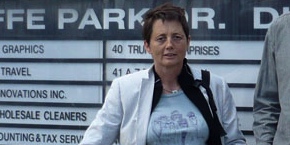Hot on the heels of Alan Li rejecting his appointment as Pride Toronto grand marshal, Jane Farrow has turned down her honoured dyke title, citing censorship of Queers Against Israeli Apartheid.

Jane Farrow (janeswalk.net)
Read Jane Farrow’s open letter to Tracey Sandilands, executive director of Pride Toronto:
***
Dear Tracey;
Thank you so much for your offer of the
privilege of being Pride Toronto’s 2010 Honoured Dyke. While I did
accept this accolade last week while away on vacation, I have returned
home and have now caught up on recent events. I see that your board has
voted to disallow the words ‘Israeli apartheid’ from being used at this
year’s Pride festivities. In light of these developments, I have
reconsidered your well-intentioned offer and feel that I must decline
Pride Toronto’s offer of the Honoured Dyke title. (I do understand that
some of your print deadlines have passed and it is too late to reflect
these changes in all your published materials.)
As a long time cultural producer,
journalist and community organizer, the practice and ideals of free
speech are very dear to me. I also value and celebrate the political
essence of my queer identity. Queers have rightfully insisted that the
personal is political, so when more than a few of us get together in
one place, political terrain is created. To me, queer gatherings of any
sort – parades, demos, cultural events, sporting clubs and disco dance
parties – are and always will be implicitly political events. It’s
little wonder then that a wide variety of political groups and voices
seek to be heard at pride festivities.
These public events provide important,
even crucial, public spaces for the exploration not just of our sexual
identities and interests, but also ideas and political discourse. I am
proud of the vast array of voices, causes and organizations that come
out to be seen and heard at our events. This is not to say that I have
never been offended by political policy in action, as well as speech
and discourse that I have witnessed and been affected by at these
events. But I’ve always known that if I wanted to I could (and did)
engage with groups or individuals and air my disagreements and
differences. I am grateful to live in a democracy where I have a
constitutionally protected right to do so.
A discourse of ‘safety’ and ‘inclusion’
has been put forward to justify censorship at Pride 2010. I feel this
is unfortunate and wrong-headed. I, like many people, do not feel ‘safer’ or ‘included’ by any decision to limit political speech. Quite
the opposite. As history shows, suppressing people’s right to express
and explore political difference leads to some very dark and dangerous
places.
Pride emerged out of the impulse to simply
take up public space and declare our right to exist in spite of our
fear, even panic at doing so. Not everyone believed that being queer in
the streets was something to be proud of, but we did it anyway. It was
the right thing to do. I believe this is the beating heart, beauty and
brilliance of EVERYTHING that calls itself queer. And so for me, the
issue at hand is not one of left or right, corporate or anti-corporate,
or even who’s politically right or wrong in the Middle East. It simply
comes down to protecting the right to free speech – fiercely, as it
were.
The offer of Honourary Dyke was very much
a welcome honour and accolade originally but I am sorry to say that I
cannot accept it now. I stand with a growing number of community
members and observers who are advocating for a queer pride party that
truly celebrates diversity, and invites us all to take part in open,
democratic discourse about politics, sexuality and community.
I encourage you to rethink and rescind your decision to limit free speech at Pride 2010.
Sincerely,
Jane Farrow
cc: Co-chairs and members of Pride Toronto Board
***
Read more:
- Watch: Queers Against Israeli Apartheid at Toronto Pride 2009
- Alan Li rejects appointment as Pride Toronto grand marshal
- Banning QuAIA sets a dangerous precedent: Toronto Pride founders
- Protesters demand Pride Toronto reverse censorship decision
 Why you can trust Xtra
Why you can trust Xtra


